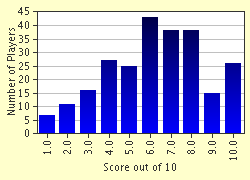Quiz Answer Key and Fun Facts
1. Otto von Bismarck, the "architect" of the German Empire, used the desire of many Germans for unification to increase the power, size and influence of one of the German states. Which?
2. What was Bismarck's purpose in going to war against Austria in 1866?
3. In a speech made by Bismarck in 1862 about possible German unification, what did he say would decide the great issues of the day?
4. "On to Berlin" was the cry of the Austrians when they declared war on Prussia.
5. The immediate cause of confrontation between France and Prussia was a dispute over a vacant European throne. Which country had a vacant throne at the time?
6. When was the Franco-Prussian War?
7. Which Prussian King's words were edited by Bismarck in the "Ems dispatch", to make it seem that he insulted the French ambassador in a meeting they had had?
8. After the defeat of the French when was the German Empire ("Kaiserreich") proclaimed?
9. Unification helped Germany become an industrial giant and acquire the leading role in Europe.
10. After unification, the constitution drafted by Bismarck established what in Germany?
Source: Author
Cori14
This quiz was reviewed by FunTrivia editor
bloomsby before going online.
Any errors found in FunTrivia content are routinely corrected through our feedback system.
